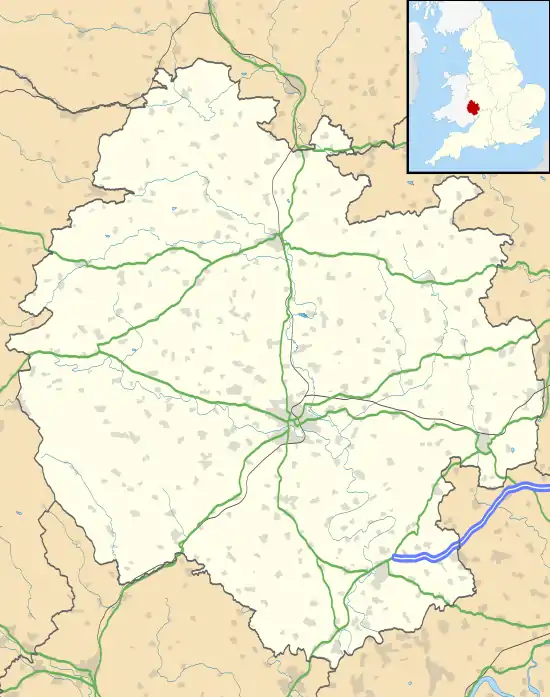Coddington, Herefordshire
Coddington is a hamlet and civil parish in eastern Herefordshire, England, about 3 miles (4.8 km) north of Ledbury.[1] The west side of the parish covers part of the Malvern Hills, an official Area of Outstanding Natural Beauty. Coddington shares a parish council with neighbouring Bosbury.[2]
| Coddington | |
|---|---|
 Coddington from Oyster Hill | |
 Coddington Location within Herefordshire | |
| Population | 99 |
| OS grid reference | SO719427 |
| Civil parish |
|
| Unitary authority | |
| Ceremonial county | |
| Region | |
| Country | England |
| Sovereign state | United Kingdom |
| Post town | LEDBURY |
| Postcode district | HR8 |
| Dialling code | 01531 |
| Police | West Mercia |
| Fire | Hereford and Worcester |
| Ambulance | West Midlands |
| UK Parliament | |
Geography
The parish is small in area and population, with dispersed small settlements and farms. The church and surrounding hamlet (of Coddington) stand on a hillock rising to 110 metres (360 ft). The highest point in the parish is Oyster Hill at 211 metres (692 ft), which has an Ordnance Survey triangulation station. Other places in the parish include Coddington Cross (at a crossroads on the main road through the parish, which does not pass through the hamlet of Coddington), Bush Farm, Pithouse Farm, Coddington Court, and Woofields Farm.[1]
The nearest railway stations are Ledbury and Colwall, both about 3.5 miles (5.6 km) away by road.[1] The Herefordshire Trail, a long-distance footpath, passes through the parish, calling at the vineyard, the church and Oyster Hill.
History
Coddington was recorded as a manor in the Domesday Book (1086), then spelled as Cotingtune; the manor was held by the Bishop of Hereford.[3]
The Ordnance Survey map of 1887 shows a school and a post office in the hamlet. It also shows two public houses: the Plough Inn and the Golden Cross Inn, on the lane between Coddington Court and Coddington Cross. All these amenities have now closed.
Coddington was home to Clyde Petroleum, established in the 1970s by a group of ex-Royal Dutch Shell employees.
The parish has many listed buildings, including many black and white half-timbered dwellings, of which Bush Farm is listed Grade II*.[4]
Religion

The Church of England parish church of All Saints is a Grade II* listed building built largely in the 12th–13th centuries. It features a broach spire.[5] Church services are shared with nearby Colwall.[6] The churchyard includes a Grade II* listed cross, whose base dates from the 14th century.[7]
There is a Buddhist retreat and study centre at Coddington Court.[8]
Demographics
The 2001 census gave Coddington a population of 108,[9] and the two parishes of Bosbury and Coddington combined a population of 888. This fell by 8.5 per cent to 813 at the 2011 census,[10] giving an estimated population for Coddington of 99.
Politics
Coddington (two seats) shares a parish council with a larger neighbour, Bosbury (eleven seats).[2] They and the parishes of Colwall and Mathon form the ward of Hope End, which elects one member to Herefordshire Council.[11] At the most recent election in May 2015, the Conservative candidate, Tony Johnson, won the seat.[12] He has since been elected Leader of the Council.[13] Coddington lies in the North Herefordshire parliamentary constituency, represented by Bill Wiggin (Conservative).
Notable people
- Lionel George Curtis (1872–1955), a prominent advocate of one-world government, was born in Coddington.[14]
- Sangharakshita (London-born Dennis Lingwood, 1925–2018), writer, commentator and founder of the Triratna Buddhist Community, lived in Coddington.
External links
![]() Media related to Coddington, Herefordshire at Wikimedia Commons
Media related to Coddington, Herefordshire at Wikimedia Commons
References
- Ordnance Survey mapping
- Bosbury and Coddington
- OpenDomesday Coddington
- British Listed Buildings Coddington.
- British Listed Buildings All Saints, Coddington.
- Colwall church All Saints
- British Listed Buildings Churchyard Cross, Coddington.
- Adhisthana
- Neighbourhood Statistics Archived 15 March 2016 at the Wayback Machine Parish Headcounts for Herefordshire 2001.
- "Civil Parish population 2011". Archived from the original on 4 March 2016. Retrieved 28 October 2015.
- LGBCE Final recommendations 2014 review – PDF map Archived 2016-02-15 at the Wayback Machine.
- Herefordshire Council Hope End declaration 2015
- Herefordshire Council Cllr A W Johnson.
- Tom Cargill: "How to build a better world", History Today Vol. 63, No. 2, February 2013.